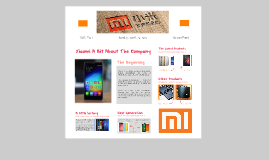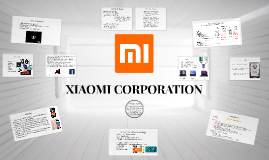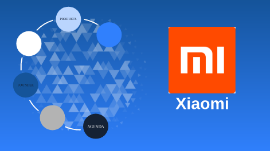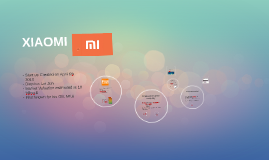XIAOMI
Transcript: Pricing Business Initiatives & Strategy Xiaomi has been a successful company from the start and it is only getting better throughout time In the short 9 years, its founder and CEO Lei Jun has become worth an estimated $12.5 Billion USD and became China's 11th richest person The company values at approximately $46 Billion USD They offer easy to use equipment for all ages to use. Xiaomi is becoming rapidly popular throughout the globe, even so that many people are even comparing their products to Apple. The company kept expanding its network, little by little, but the latest push is a big one. Another strategy for Xiaomi would be to follow in the footsteps of other Chinese tech conglomerates and invest in international companies. This would allow Xiaomi to further establish their leading role in China and abroad. 20 November 2018 Xiaomi India announced the opening of 500 stores simultaneously, Global Strategies Fulfillment of India’s regulations Fair pricing of products. Development of multi-brand strategy Introduction of web-based services in India Introduction of Internet of things (IoT) Supporting SDGs, human rights, and environmental sustainability Challenge Corruption in India PESTEL Framework China’s advancements in tech have quickly ranked them as a global technological leader and they are soon to be #1. XIAOMI CORPORATION Millet ( )CC9 Pro - $397.82 Millet ( )Pro 5G - $524.18 Millet ( ) 9 - $383.61 Millet Notebook ( ) Pro 15.6” - $682.08 RedmiBook 14 - $568.38 Gamebook 2019 ( ) - $1037.41 Social: It is estimated that nearly 1 in 5 people own smartphones, creating an expansive market for tech companies. Although Xiaomi is committed to delivering quality products, the notion that Chinese products are substandard is likely to affect the profitability of the company in the international market. High-quality technology brand Selling products at a lower price than competitors "Apple of China" 4th largest retailer of smartphones Competitors Risk Who is Xiaomi? Political: China has a socialist framework and is governed by the Communist Party. There have been many capitalist reforms in China, specifically in the form of tech . The protectionist policies adopted by the Chinese government have greatly benefited Xiaomi, increasing its market share and achieving a competitive edge. Similarities The Look Differences Consumer demand Apple: Pays less attention to consumer demand, instead, imagines what consumers want Xiaomi: Customizability, MiFans incorporates user feedback (abandon pre-installed MIUI system) Friday at 5PM, MIUI software updates, forums open to describe bugs/give feedback Marketing Strategy Apple: Global, buy-it-everywhere blowouts Xiaomi: "hunger-marketing" strategy, very limited sales windows August 2013, Xiaomi Red Rice, 100,000 units, sold within 90 seconds What makes Xiaomi stand out from Apple? CEO, Lei Jun Engineer by training Co-founded Kingsoft, a Chinese software company Founded Joyo.com, largest online retailer (books, music, movies) in China Xiaomi was founded in 2010 from mobile chip developer Qualcomm and Temasek Holdings The company released its first product in 2011 - Android software with its first smart phone called the Xiaomi Mi 1 It is primarily based in Asia, but has migrated globally. The main countries they supply its products to are China, India, Malaysia, and Singapore with expansions to The Philippines, Indonesia, and South Africa Primarily based in the Asia region, Xiaomi currently employs 15,000 workers with plans to hire more for their fast growing company China is also set up for success when it comes to its proximity to emerging markets around India and Southeast Asia. This is a large reason behind the success of Xiaomi's international expansion. Flash sales in countries like Pakistan, India and Taiwan have sold out in record time. Recently, Xiaomi has opened 7 retail stores in South America, the latest location being Uruguay. PESTEL Framework Products Technological: Over the years, Xiaomi has cut a niche for itself as a provider of a wide range of products, like smart TVs, smartphones, and smartwatches. The organization must continue investing in research and development to be able to manufacture products with cutting-edge technology. Environmental: China has suffered greatly when it comes to their environment due to the modernization and industrialization of their society. These factors, and their economic growth, have led to severe air pollution. Xiaomi must work towards creating systems/processes that will have a minimal impact on the environment. Legal: As of August 2019, the US has been barred from doing business with Chinese tech companies, who have been allegedly leaving opportunities for espionage by their government. Other relevant legal issues are to the company data privacy and IP laws. These issues may influence how Xiaomi conducts business. Laptops Air dots Trimmers Bags Shoes Software Fitness bands Xiaomi, the "Apple of China"? History Economic: China

















